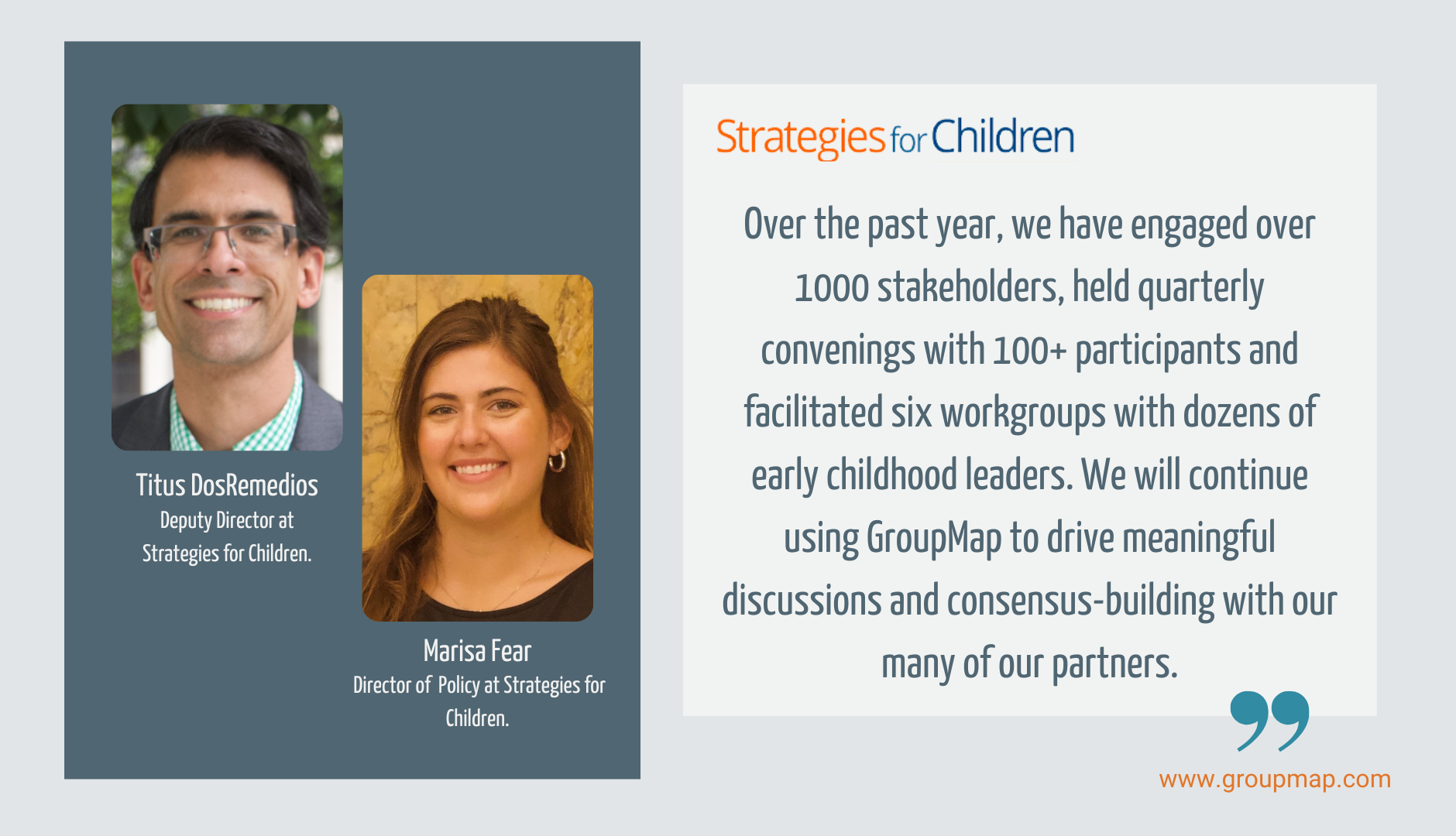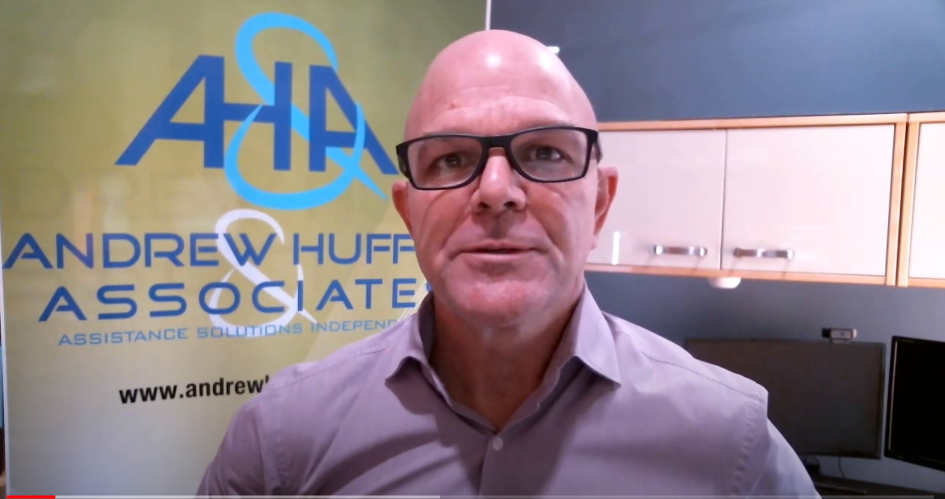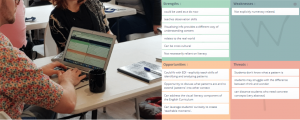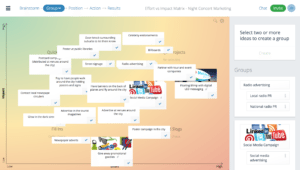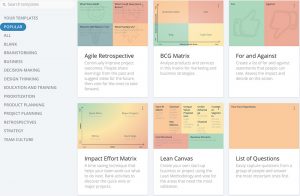Strategies for Children (SFC) is a Massachusetts-based nonprofit dedicated to ensuring that children from birth to age five have access to high-quality early education programs. For 24 years, SFC has been a leading advocate in the early childhood sector, focusing on four major initiatives: The 9:30 Call, The Advocacy Network for Early Childhood, The Early Childhood Agenda, and the Eye on Early Childhood blog.
The Early Childhood Agenda, launched in 2022, brought together over 1,000 stakeholders to identify key priorities for advancing early childhood education. The initiative has since led to significant advocacy wins, new workgroups, and strengthened partnerships in the sector. To facilitate collaboration and consensus-building, SFC turned to GroupMap as a key tool in their engagement strategy.
About Titus and Marisa
Titus DosRemedios, is the Deputy Director at Strategies for Children (SFC), a Massachusetts-based nonprofit dedicated to advocating for high-quality early education and care. In his role, Titus oversees general operations, staffing, grant writing, budget development, and manages the Advocacy Network for Early Childhood. Since joining SFC in 2008 as a Research and Policy Associate, he has led numerous initiatives, including consulting with local communities on preschool planning and expansion efforts, co-facilitating the New Bedford Birth–3rd Partnership from 2016 to 2020, and facilitating the Massachusetts Partnership for Infants and Toddlers from 2019 to 2022, a statewide public-private collaboration with 60 member organizations. He also served as the inaugural co-chair of the Massachusetts Early Childhood Funder Collaborative’s Community Advisory Committee from 2021 to 2022.
Marisa Fear
Marisa Fear serves as the Director of Policy at Strategies for Children (SFC), where she contributes to advocacy, research, policy, and communication efforts aimed at enhancing early childhood education and care in Massachusetts. Her responsibilities include managing SFC’s COVID-19 support initiatives, producing daily advocacy calls for the early education and care field, documenting ongoing challenges, monitoring data trends, state and national budget proposals, and policy changes from the Department of Early Education and Care. Marisa facilitates the Speakers’ Bureau—a statewide cohort of early educators—and collaborates with the field to build advocacy capacity in local communities. She also works closely with SFC interns and manages collaborations with external partners. Marisa is a member of the Department of Elementary and Secondary Education’s working group on Early Childhood and Out-of-School Time.
Challenges Faced by Strategies for Children
Before using GroupMap, SFC faced challenges in coordinating input from a diverse group of stakeholders across Massachusetts’ early childhood sector.
“We needed a way to facilitate meaningful discussions in both virtual and in-person settings while efficiently collecting feedback from educators, families, and policymakers,” said Titus DosRemedios.
Without a structured system, gathering and organizing ideas from large meetings and workgroups was time-consuming and challenging to translate into actionable strategies.
How GroupMap Helped
To address these challenges, SFC implemented GroupMap as a tool for facilitating discussions, brainstorming, and achieving consensus across multiple engagement levels.
Large Group Convenings
“We committed to hosting large-group convenings on Zoom, roughly once per quarter, after releasing The Early Childhood Agenda in January 2023,” shared Marisa Fear. “Our first such meeting in June 2023 attracted nearly 100 attendees.”
Using GroupMap, participants provided feedback on how they had been using the Agenda in their work and shared ideas on evolving its structure.
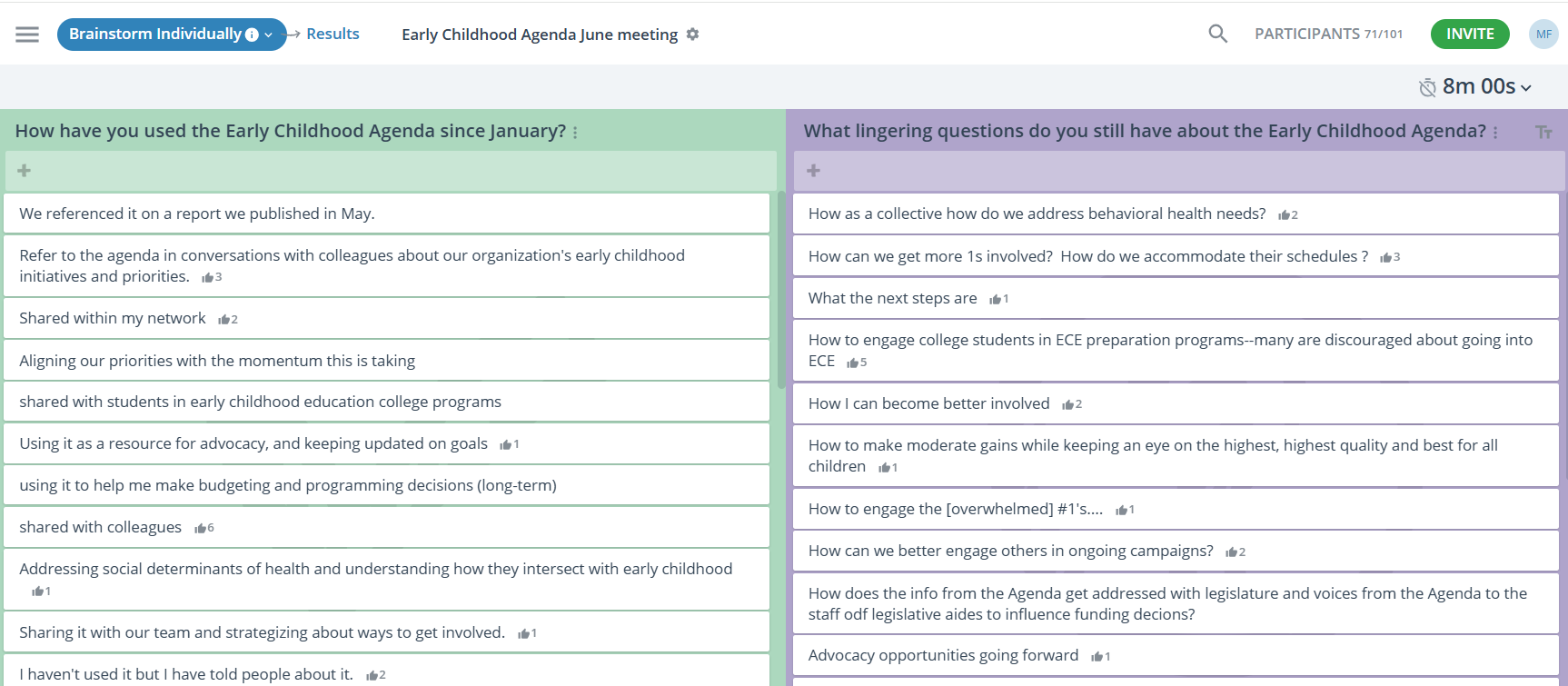
Workgroup Meetings
SFC launched six workgroups to develop solutions for key priorities.
“Each workgroup relied on GroupMap to break down complex issues, identify key stakeholders, and refine actionable recommendations,” explained Marisa. “For instance, workgroup #4 used GroupMap to list top recommendations, define clear objectives, and anticipate potential barriers.”
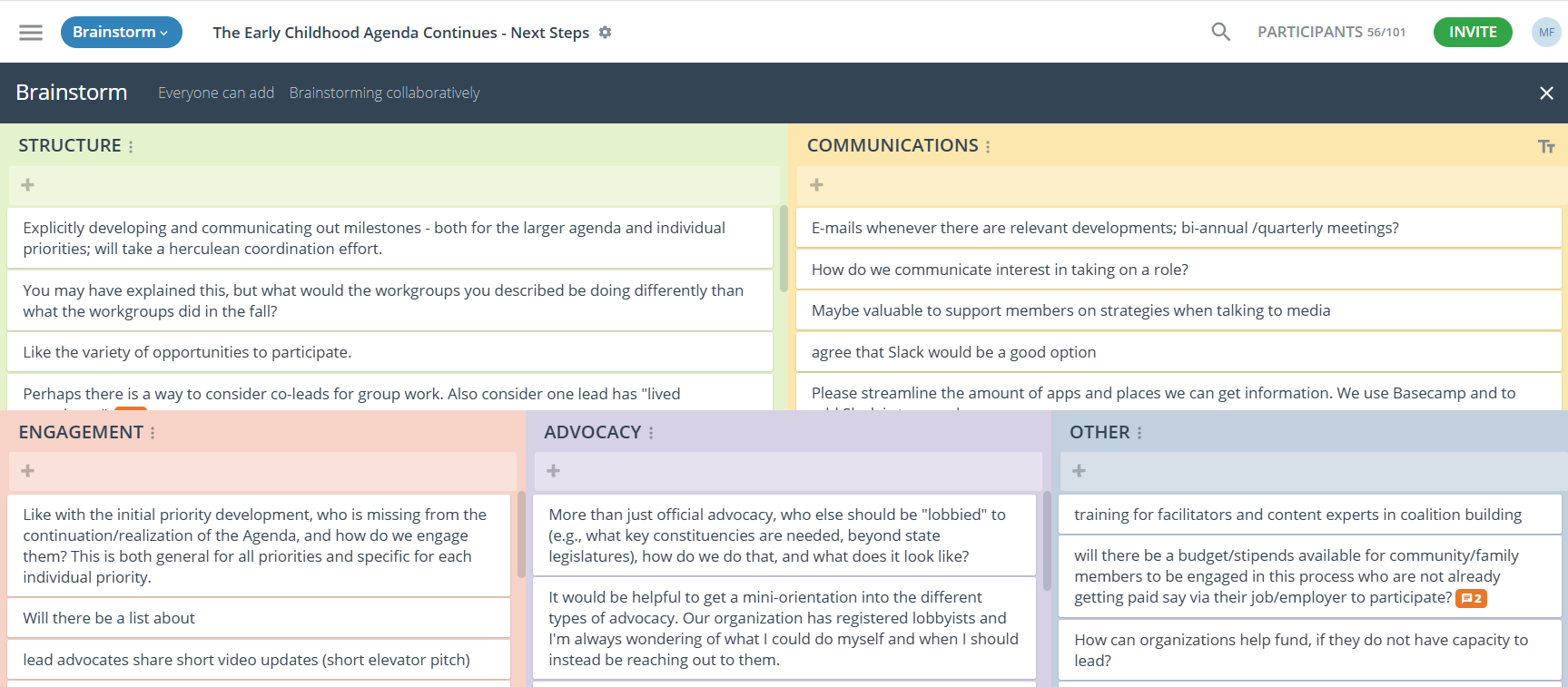
Stewardship Team Coordination
SFC created a Stewardship Team to recognize the need for a coordinating leadership body.
“GroupMap helped us track progress, collect feedback, and foster collaboration among facilitators and partners,” said Titus. “At our first Stewardship Team meeting, we used GroupMap to gather input on how this structure could be most effective.”
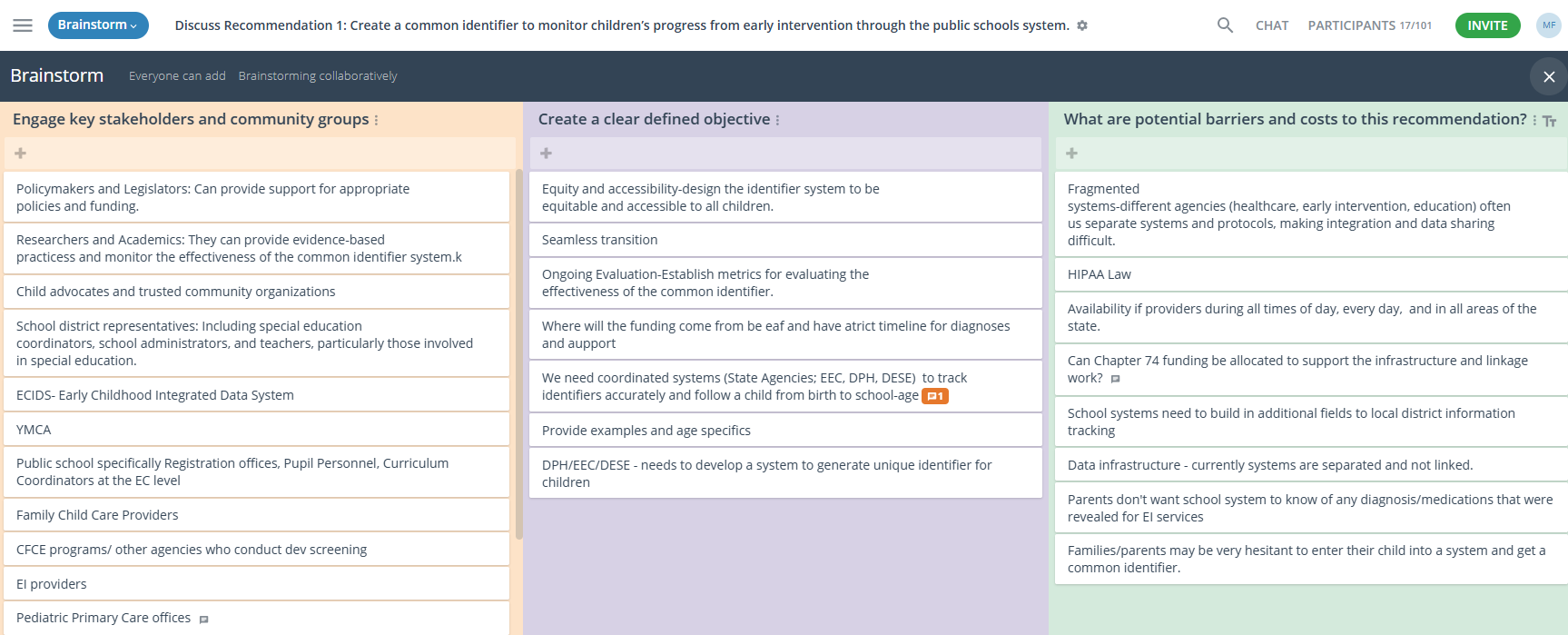
Outcomes and Benefits
The adoption of GroupMap significantly improved the efficiency and effectiveness of SFC’s engagement efforts. “Stakeholders reported a greater sense of involvement as they could see their contributions reflected in real-time,” said Marisa. “The tool’s interactive nature made it easier to build consensus and develop policy recommendations collaboratively.”
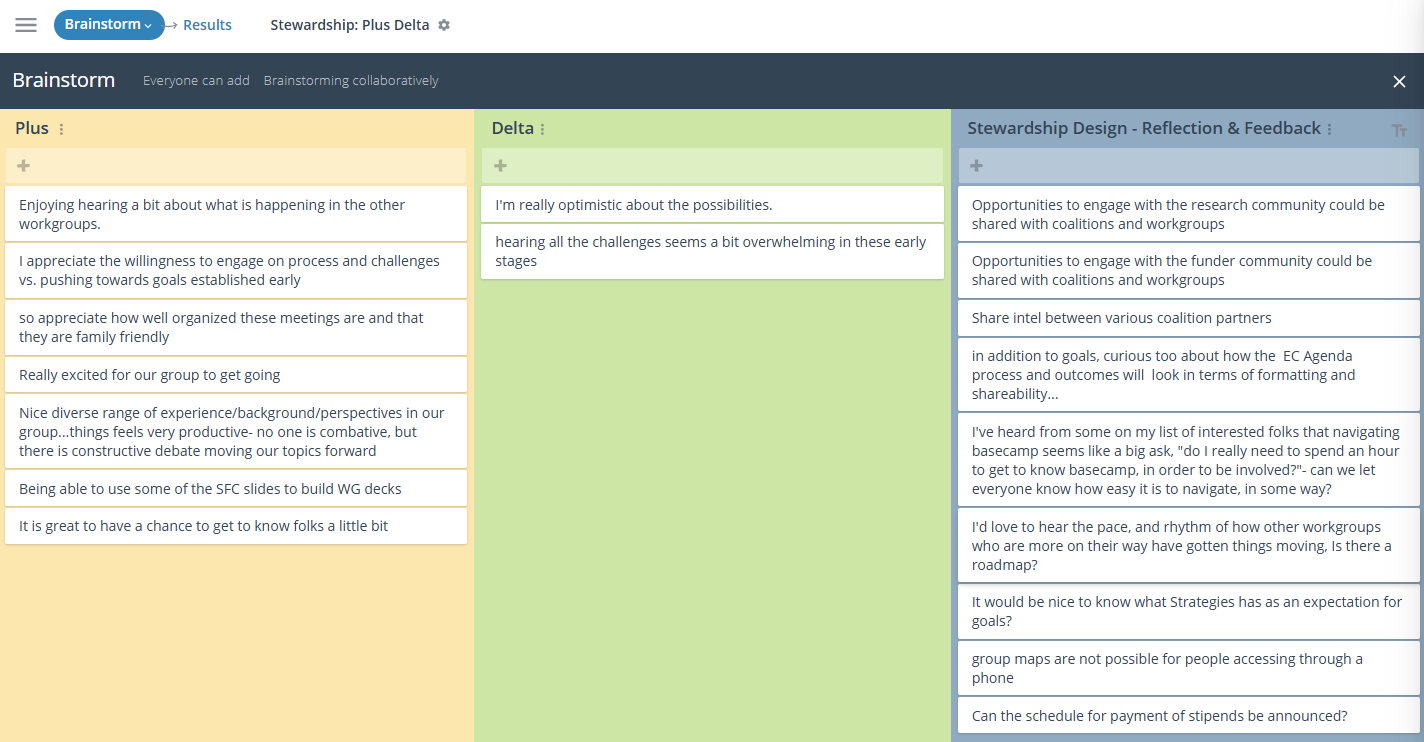
SFC’s efforts have led to tangible outcomes:
- Engaged over 1,000 stakeholders in shaping early childhood policies.
- Held quarterly convenings with 100+ participants, including an in-person event at Polar Park baseball stadium.
- Launched six workgroups to tackle high-priority issues.
- Drafted actionable recommendations for publication in 2024.
“Using GroupMap has been a game-changer,” Titus emphasized. “It allowed us to structure discussions effectively and ensure that every voice was heard.”
What Participants Had to Say
“GroupMap provided a structured way to gather and prioritize ideas,” said one participant. “It made complex discussions more productive and inclusive.”
Another stakeholder noted, “I appreciated how easy it was to contribute my thoughts and see how they fit into the bigger picture. It really helped us move from brainstorming to actionable strategies.”
The Future of The Early Childhood Agenda
As SFC finalizes the next phase of The Early Childhood Agenda, GroupMap remains an essential tool for fostering innovation, supporting decision-making, and driving meaningful progress.
“We are excited about the next phase of our work and will continue to use GroupMap for consensus-building,” said Marisa.
